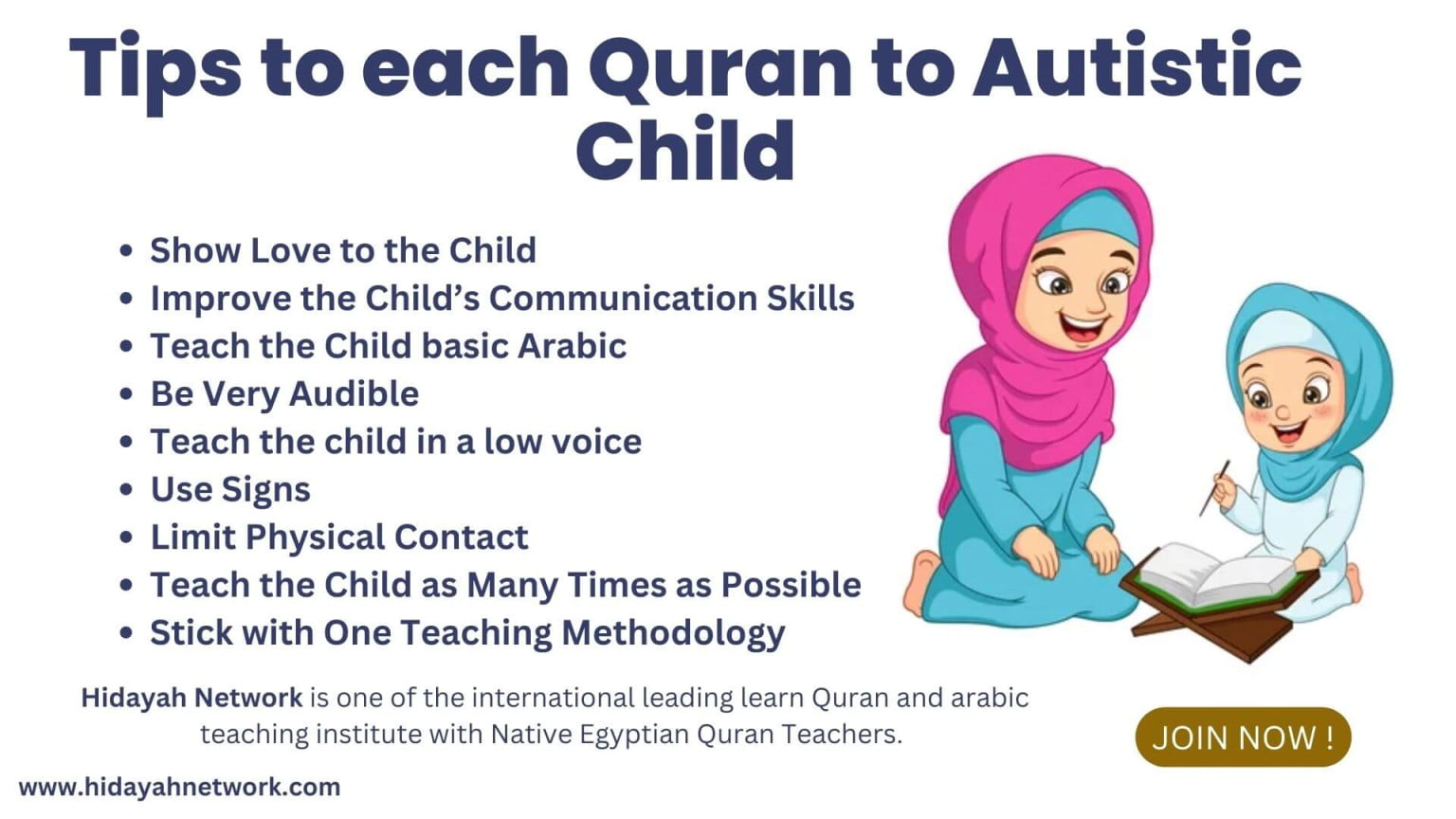How to Teach Quran to Autistic Child

- Hidayah
- Network
- | Role: Hidayah Network

Autism spectrum disorder is a developmental disability caused by differences in the brain. Autism disorder begins before the age of 3 and can last throughout a person’s life. Children with autism may behave, communicate, interact, and learn in ways that are different from most other people. For parents, who have autistic child, there specific ways that can help their special kid learn Quran.
You can teach the Quran showing great affection, working on better communication skills, teaching the basics of Arabic at the beginning, making sure that you are audible, using signs to make them understand, and more. Let’s discover in detail how you can implement these techniques in your daily Quranic sessions with your Autistic child. Learn more here!
Table of Contents
Toggle10 Tips to Teach an Autistic Child the Quran
1. Show Love to the Child
A person who wants to teach a child the Quran must show love to the child. In Quran classes for kids, the teacher must make the child love the Quran. When it comes to teaching an autistic child the Quran, the love has to be greater.
- The Quran must find a way to make the child love the Quran he or she is teaching the child.
- The teacher must let the child know that irrespective of his or her situation; the child can recite and learn Quran like any other child.
Abu Huraira reported that al-Aqra bin Habis saw the Messenger of Allah (peace and blessings of Allah be upon him and his family) kissing Al-Hassan (the Prophet’s grandson). He (al-Aqra) said:
“I have ten children, but I have never kissed any one of them, whereupon Allah’s Messenger (ﷺ) said: He who does not show mercy (towards his children), no mercy would be shown to him.” (Sahih Muslim 2318a Book 43, Hadith 86)
2. Improve the Child’s Communication Skills
Autism can affect a child’s communication or behavior in several ways. Some of the ways autism affects a child’s communication and behavior are:
- By avoiding eye contact during conversations or other situation
- Displaying a lack of empathy for others
- Engaging in repetitive motions or behaviors
- Engaging in self-harming or self-destructive behaviors which may also be repetitive
- Failing to interpret social cues correctly
- Showing lack of interest in socializing with others.
A teacher can help improve the communication skills of an autistic child by communication board. Communication boards enable nonverbal children to express themselves by
- Pointing or gesturing at images which may be photographs
- Illustrations, or symbols
- Using a Picture Exchange Communication System. PECS uses images to represent thoughts and requests.
- Speech Generating Devices can be very helpful, a piece of equipment that produces speech for the user, either through alphabet keys or visual symbols.
Furthermore, if the teacher knows how to use sign language, the teacher should employ the use of sign language as it can be very helpful in improving the communication skills of autistic children.
Get 40% OFF Now!
3. Teach the Child basic Arabic
The process of teaching the child “how to recite the Quran beautifully” starts with teaching the child basic Arabic. Once the child learns the Arabic letters and starts pronouncing Arabic words, a teacher can be happy that the work he or she is doing is beginning to yield results.
4. Be Very Audible
A person who wants to teach a special child how to recite the Quran must be very audible. The person must speak in a way that the child will hear what he or she is saying because the child might not notify the teacher if he or she does not hear what the teacher is saying.
5. Teach the child in a low voice
Islam encourages us to talk to ourselves and pray in a normal voice. Evidence of these can be drawn from Surah al Hujurat, and Surah Luqman. Raising the voice while speaking is contrary to proper manners and indicates a lack of respect for the person you are talking to.
Autistic children become more agitated and confused if a speaking voice is too loud. During recitation, reciter can regulate his or her voice in such a way that the child will not feel threatened by the voice of the person.
6. Use Signs

A teacher can employ the use of signs for autistic children. To understand words and signs, the teacher must teach the child how to pay attention to them and learn that words and signs have meanings. Also, a teacher should encourage the child to make sounds because the recitation of the Quran requires the making of sounds.
7. Limit Physical Contact
While physical contact during teaching is good for children, it is better to limit it when teaching autistic children because they cannot properly interpret body language and touch. Therefore, limiting physical contact while teaching autistic children is the best option.
8. Teach the Child as Many Times as Possible
A person who wants to teach an autistic child the Quran must be patient and willing to sacrifice his or her time. If it takes 1 hour to teach a child the Quran, it will take more than that to teach an autistic child the Quran.
The teacher should recite any verse he or she wants to teach the child as many times as possible. It is one of the ways the child can pick what the teacher is teaching.
9. Stick with One Teaching Methodology
A person who wants to teach an autistic child must design a good plan for the child. After designing the plan, the person should stick to the plan. Changing plans frequently can hamper the flow of study of the child.
10. Try to Play Audios of the Quran in the Child’s Free Time
Playing audio of the Quran during an autistic child’s free time can profoundly aid their learning.
- Firstly, it offers auditory stimulation, which is often a preferred learning mode for autistic individuals. Repetitive listening can enhance comprehension and memory retention.
- Additionally, it provides a consistent routine, aiding in structure and predictability, which are comforting for many autistic children. The soothing nature of Quranic recitation can also help regulate emotions and reduce anxiety.
- Finally, exposure to different reciters introduces variety, catering to individual preferences and enhancing engagement.
Popular reciters include Mishary Rashid Alafasy, Abdul Rahman Al-Sudais, Maher Al-Muaiqly, and Saad Al-Ghamdi. Their diverse styles offer a rich listening experience, fostering a deeper connection to the Quran.
Which Surah is the Best for Autism?
Surah Al-Ikhlas has been observed to play a beneficial role in stimulating autistic children’s self-monitoring skills. Through the recitation of this surah, autistic children have demonstrated an enhanced ability to listen not only to their own voices but also to others during regular conversations, leading to a natural improvement in sound quality.
This Quranic verse, known for its concise and profound message about the oneness of God, appears to contribute positively to the development of auditory and communication skills in children with autism.
Stories for Autistic Children Memorizing the Quran
Engaging autistic children in the memorization of the Quran can be a rewarding and enriching experience. Stories tailored to their unique learning styles can make this process more enjoyable.
Story 1
In a not-so-distant land, young Abdul ‘Aziz, a special child with Autism Spectrum Disorder, harbored a profound love for the Qur’ān. Despite facing challenges, his enchantment with the Quranic verses led him on a remarkable journey.
From his early years, he immersed himself in the Qur’ān’s teachings through radio, phone, and videos. Displaying a magical talent, Abdul ‘Aziz, at the age of 14, astounded his family and teacher by independently memorizing the entire Qur’ān.
His melodic recitations caught the attention of the Ludun Charitable Association, sparking a competition where he shone brightly among 200 participants. The association, impressed by his talents, planned to broadcast Abdul ‘Aziz’s recitations during Ramadan, ensuring his voice resonated worldwide, inspiring children to embrace the Qur’ān.
Story 2
Said Shaiye, an autistic Somali writer residing in Minneapolis, shares the challenges he faces when attending Friday prayers, particularly the overwhelming sensory experiences caused by loud environments, small talk, and fluorescent lights.
Shaiye discloses his struggles with autism, emphasizing the heightened sensitivity to noise and light that often leaves him seeking solace in his “Fortress of Solitude.” Despite these challenges, Shaiye expresses a deep desire to benefit from the Friday sermon and engage in prayers.
Notably, Shaiye discusses his use of noise-canceling headphones as a coping mechanism, allowing him to manage the sensory overload during prayers. Despite societal misconceptions about how autism appears, Shaiye reflects on his unique journey, intertwining his experiences of surviving a war as a child with his dedication to memorizing the Quran.
His narrative sheds light on the importance of understanding and accommodating individuals with autism in religious spaces, highlighting the need for compassion and acceptance within the Muslim community.
Conclusion
Allah created us as he wished. No one can question how Allah created him or her. If Allah tests a child with Autism disorder, it does not mean the child should be rendered useless. A child with autism disorder can learn and recite the Holy Quran like his fellow children. Enroll your kids in beginners Quran classes so that they can learn from the beginning from every aspect.
Love is the first condition in the quran to special children. You have to make the child realize that no matter the condition, the child is loved. You have to make the child realize that he or she can acquire knowledge of the Quran just like any other child. Also, you have to improve the child’s communication skills. Autistic children suffer from communication defects, therefore, it is another area you have to work on.
Frequently Asked Questions
Surah Al-Ikhlas stimulation taught autistic children to develop self-monitoring skills.
Praise their efforts when you see them reciting the Quran. Also, share the inspiring stories in the Quran with them.
Some students with autism learn best through sound while others learn through strong visuals.
There is no specific treatment or prayer from the Quran or Hadith for autism. But we can pray to Allah to cure a child of autism in our daily prayers.
U’izukuma bikalimatu-lahit-tammati min kulli shaytan in wa hammah, wa min kulli ainin lammah.
Translation: I seek protection for you in the perfect words of Allah from every devil and every beast, and from every envious blameworthy ey

